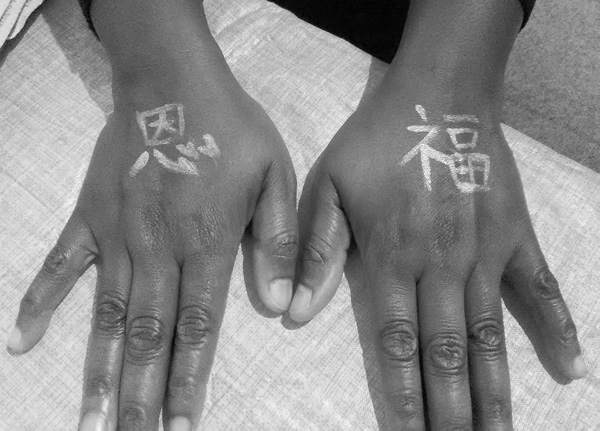
GOOD KANJI
first performed on February 12, 2016
National Domestic Workers Alliance Headquarters, Manhattan, NY
performed once in 2016
AKIKO ICHIKAWA
Booklyn, NY
987546965a987546965k987546965i987546965k987546965o987546965.987546965i987546965c987546965h987546965i987546965k987546965a987546965w987546965a987546965@987546965g987546965m987546965a987546965i987546965l987546965.987546965c987546965o987546965m
akikoichikawa.info
GOOD KANJI
AKIKO ICHIKAWA
Japanese writing—katakana or kanji (Chinese-derived characters) combined with the phonetically-based hiragana—has featured widely in American street culture for nearly two decades. In clothing and body art, adults of all social classes sport these texts on their arms, necks, and torsos, looking cutting edge to many, but silly to others. Under the influence of hip-hop and the global reach of their clothing brands, this writing has become a fashion statement, “merely” visual as translations are ignored or forgotten. Even in the case of tattoos, characters are often written incorrectly. This of course works the other way with people in every major Asian metropolis going about with nonsensical English on shirts, jackets, and accessories.
I staged a participatory gifting performance as part of a day of resilience for Domestic Workers and Allies, organized by Irene Jor, at the rented offices of the National Domestic Workers Alliance at 395 Hudson Street. I painted temporary Japanese character tattoos on domestic workers who came between 4 pm and 7 pm, having been given a list of the day’s events beforehand which included a group therapy session, a knitting class, movement, and meditation.
My participants picked from my list of eighteen characters, including ones for good fortune, deep, and breathe. Participants could have them painted in gold or red on their hands, wrists, or arms. While painting, we talked about cultural differences, accents, the characters’ meanings, and the politics of their home countries. I took only photos of their hands, wanting my participants to relax and not worry about being documented.
I sat for three hours, giving out a total of eight tattoos. Six of the seven participants were adults, the seventh the young grandson of a domestic worker. Barbara, from Jamaica, got a second tattoo after spending some time in the knitting room. I accompanied her there, and I flipped through online videos about Trump on the projector. She was extremely relaxed and happy at the end of the process and I was pleased to know I was part of making that happen. The three Nepalese participants seemed shyer, not paging beyond the list’s first page, and chose the simpler characters mind/spirit and heaven/sky. One explained they reminded her of characters in Nepali. The knitting instructor, a domestic worker from Peru, got the character for iron and told me about living under the dictatorship of the Shining Path, when utilities like water and electricity were cut.